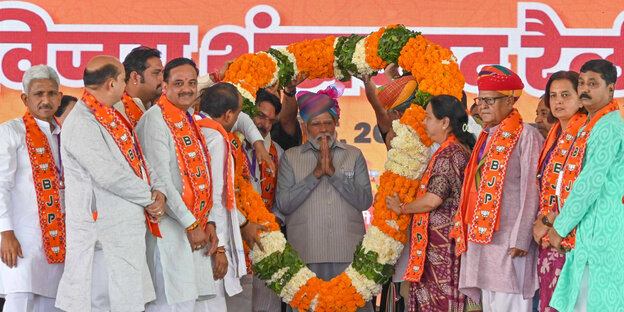Parties can be bought indirectly in India. Voters should question lofty promises: they are worried about public services.

Election campaign in India: Prime Minister Narendra Modi (BJP) during a public meeting in Pushkar Photo: Shaukat Ahmed/imago
We are living in a politically decisive year, also in India: there, one billion voters currently decide who will determine their destiny in the future. Will they get a government that also cares about the landless farmers living in small shacks in the most remote areas of India? Or a government that promises equality in its electoral slogans, but in reality allows millionaires to get even richer if they continue destroying forests and rivers?
In recent months, the mutual dependencies between the ruling party, the BJP, and big business have become very clear. It was revealed that large donations had been made to the BJP covertly and anonymously since 2017. The transparency that is actually required for such political donations since a Supreme Court ruling in February is non-existent. 99 percent of these donations went to the BJP. They came from the large mining company Adani, which has recently also started operating in the media sector. It is also said that mining projects endanger the Great Barrier Reef in Australia.
Political parties can only finance their electoral campaigns through donations. Whoever donates a large sum expects good will from the government. Data on these types of donations used to be public, but the BJP has undermined the transparency requirement since 2017 with a new financing method that works through bonds. Prime Minister Narendra Modi came to power with a big promise to eliminate corruption. Millions of Indians have not forgotten that, in the name of this fight, he announced overnight in 2016 that large banknotes would no longer be valid. Those who, like many poorer Indians, hoarded those notes as emergency reserves but did not have a bank account, lost their savings at that time.
The corrupt system of anonymous donations through vouchers was tolerated by the opposition parties because they also hoped to benefit from it. But the vast majority went to the BJP. Citizen initiatives are now pressing for the Supreme Court ruling to be applied. In fact, the names of donors and recipients should now be able to be revealed. This is causing excitement in the media on the eve of the parliamentary elections, which will take place in seven stages from April 19 to June 1.
You can try to fight corruption in many ways, but there are just as many ways to evade controls. When I lived in the United States starting in 2012, large corporations openly attempted to influence the outcome through campaign donations to one party or another. This seemed undemocratic to me because in India we suspected that candidates might spend large sums of money on election campaigns.
But maybe I was wrong all along to see it that way. Shouldn't people pay more attention to the huge gap that opens between the noble promises before the elections and the shameful excuses afterwards for why all the beautiful plans did not come to fruition? The media is now talking about which company donated and which project was approved. But for the vast majority these are basic everyday services “sadak – bijli – paani” (German: roads, electricity, water). And although they do not have the financial resources to achieve a change in government, they do have an even more important tool: their vote at the polls.
Translated from English by Stefan Schaaf.
